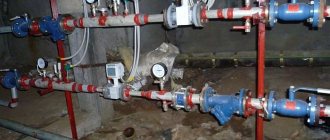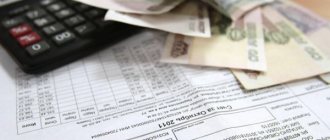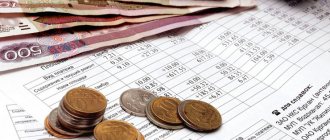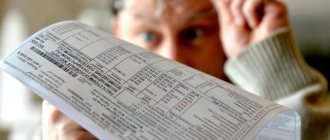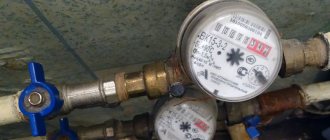Do you have to pay rent if you don't live in an apartment?
The norms of the current legislation indicate that the owner pays for utilities if he does not live in the home. This is stated in Article 153 of the Housing Code. This legal norm is subject to application precisely at the moment when a citizen has become the full owner of residential property, therefore it is necessary to pay the issued utility bills regardless of whether the owner is registered in the residential premises or is officially registered at another address.
All expenses for maintaining housing, in accordance with Art. 158 LCD, are assigned to the owner. If the apartment belongs to several citizens, each owner is obliged to pay utilities based on the specific size of the share.
The calculation of utility bills is also provided for by other norms of housing legislation. So:
- the payment structure is provided for in Art. 154;
- Art. 155 regulates the payment procedure and deadlines for making payments;
- if the apartment is equipped with meters, the supplier charges payments according to the rules of Art. 157.
Important! The amount of payment directly depends on the number of persons officially registered in the apartment. The longer you live, the more you will have to pay. At the same time, the amount of payments for heating and apartments does not depend on this indicator.
This conclusion is confirmed by Decree of the Government of the RSFSR No. 415 of 1985. This regulatory document determines that the absence of residents for more than one month entails the cancellation of payment for utilities for the period of absence.
Is it possible not to pay:
Housing and communal services rent: what is included in the payment
The main regulatory legal act containing the main provisions for paying rent is the Housing Code of the Russian Federation (LC RF).
In accordance with clause 1 of Article 153 of the Civil Code of the Russian Federation, citizens, as well as legal entities, are obliged to pay for housing and communal services in a timely manner and in full.
According to paragraph 2 of Art. 154 of the Housing Code of the Russian Federation for owners of living space in an apartment building, the rent includes the following cost items:
- Payment for the maintenance of the premises - this includes remuneration to the management company (for services in managing the apartment building and maintaining its functioning), carrying out routine repairs of the house, payment for utility resources consumed during the use of the common property of apartment owners.
- Contribution for major repairs - this can be repairing the foundation, sealing walls, replacing worn partitions, laying a new roof and other types of work.
- Payment of utilities - in accordance with clause 4 of Art. 154 of the Housing Code of the Russian Federation, this expense item includes payment for cold and hot water supply, electricity, heat, gas, wastewater disposal, as well as household waste removal.
How to avoid paying utility bills
In order not to pay utility bills if a person is registered but does not live, citizens use several methods proven by life and practice:
- First of all, housing should be equipped with meters for consumed services. With this approach, if we take payment for water as an example, charges will be made taking into account actual consumption, confirmed by meter readings. If no one lives in the apartment, therefore, services are not consumed. Consequently, meter readings will confirm zero water consumption, and the supplier will not issue invoices for payment. There is nothing to pay.
- If there are no metering devices, the owner of the residential premises should submit a written application to the supplier, notifying that there are no residents in the apartment. Consequently, no utilities are consumed. Based on such a request, water supply, gas supply, and sewerage will be blocked. True, you will have to submit a certificate that reliably confirms state registration or the fact that the owner lives in another locality or at another address. Without official papers, proving the fact of non-residence will be quite problematic.
- Turn off the meter and turn off household electrical appliances. Report the decision to the electricity supply organization in order to avoid misunderstandings if one of your neighbors tries to illegally connect to the meter.
- Rent out housing by concluding a written agreement, under the terms of which the responsibility for paying utility bills is transferred to tenants who are not the owners. This is the only way not to pay rent.
Expert opinion
Klimov Yaroslav
More than 12 years in real estate, higher legal education (Russian Academy of Justice)
Ask a Question
If the measures taken do not result in relief from paying utility bills, legal action should be filed. However, before deciding to take such a step, it is recommended to consult a lawyer who specializes in housing issues. It is important to remember that under no circumstances will you be able to reduce your rent.
Payment details
Utility bills are paid monthly by the 10th day of the month following the month in which the payment was made. So, for May 2021 it will be necessary to pay before June 10, 2021.
You need to pay the entire amount that is stated in the payment document or in the personal account of the management company or settlement center. If the owner does not agree with the charges, since no one is registered or living in the apartment, he needs to apply for recalculation.
If the apartment has an IPU for water and other resources, then it is necessary to transmit the readings monthly. Even if there is no flow, the readings must be transmitted. Otherwise, the amount will be calculated according to the social norm for 1 person. A month can accumulate up to 1000 “extra” rubles.
As a rule, water consumption readings must be submitted to the management company from the 10th to the 15th of each month, and electricity consumption by the 20th. If there is no consumption, then the same readings are transmitted as last month, then the accrual for these resources will be 0.
Important! Employees of the management company or HOA have the right to come once every six months and check the integrity of the meters and the correctness of the transmission of readings. If no one is registered or living in the apartment, it is better to agree in advance on a specific calendar date for a visit. If this is not done, the utility bill will be charged according to the social norm for 1 registered person.
You must bring documents to the management company confirming that there are no residents or registered residents in the given living space. The recalculation will be made from the date from which the application was written. This will give you the opportunity to save some money every month.
How to reduce payments for housing and communal services
It will not be possible to completely eliminate payments for housing and communal services. Rent and central heating are required to be paid. Housing is maintained using these funds. And this is precisely the responsibility of the apartment owner.
If the apartment is equipped with individual heating, the homeowner does not pay for centralized heating. However, heating of common areas, such as the landing, will be billed. There is no way to avoid paying for this service.
For other payments that you don’t have to pay if you don’t live, the approach is as follows - some can be eliminated completely, others can be reduced. For example, the housing office, TSK, and management company will be able to accommodate the wishes of the apartment owner by exempting the apartment owner from paying for cleaning the local area if he does not actually live there. It is also possible not to pay for garbage removal if the owner lives at a different address where he is registered and pays for such a service. Without providing supporting documents, this payment will be billed at the location of the property.
To reduce your gas payment, you should contact the gas supply company and submit a written application asking to stop supplying gas. However, this option can be used if there is no debt for gas supply. You can turn off the gas in your home yourself only if you have a gas meter. If there is no metering device, only the gas supply organization can stop the gas supply, whose representatives will shut off and seal the supply valve.
Expert opinion
Klimov Yaroslav
More than 12 years in real estate, higher legal education (Russian Academy of Justice)
Ask a Question
It is important to know that you will have to pay for such a service. The next day after your request, gas service specialists will shut off the gas. To resume gas supply, you will have to contact the supplier again.
Payment exemption procedure
Suppliers, as well as the management company, housing maintenance office are not interested in exempting citizens from paying for the provided utility services, therefore the person who is the owner of the property must put a requirement before these enterprises. The main condition is that the owner does not live in the apartment.
To do this, it is recommended to proceed as follows:
- Request from the contractor a written justification for the accrued amounts of utility bills. The supplier is obliged to provide a written response with reference to the law. This will allow the apartment owner to determine which and to whom utility bills will have to be paid indisputably, and which ones can be reduced or completely exempted from payment.
- Submit to the supplier official papers that confirm state registration or actual residence at another address where the owner of the property makes the required utility payments.
A written request and documents attached to the application will be a legal basis for the supplier to recalculate the amounts due for payment. The legal basis will be Government Decree No. 354 of May 2011. The document regulates the provision of utilities in an apartment building. It says that the temporary absence of residents in an apartment (and this is 5 or more calendar days in a row) that is not equipped with metering devices obliges the supplier to recalculate the billed utility bills. However, every rule has its exceptions.
The approach is the same here, so the following must be paid:
- expenses incurred by the supplier for heating housing located in a multi-storey residential building;
- gas supply used for home heating.
Important! Before recalculating amounts for water disposal (sewerage), the supplier must recalculate payments billed for water supply. The volume of consumed water used for general house needs is not subject to recalculation.
If this procedure was not followed and recalculation was not made, the only way to resolve the dispute is to file a claim. However, to do this, you should enlist the support of an experienced lawyer or practicing attorney. These specialists will advise you on the prospects, and will also help you draw up all the necessary papers in a legally competent manner. If necessary, they can represent your interests in court.




